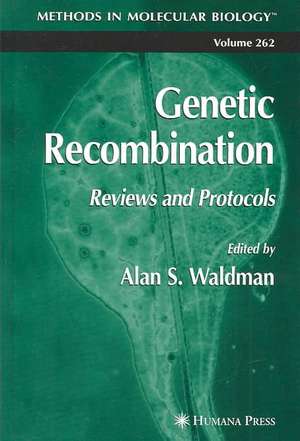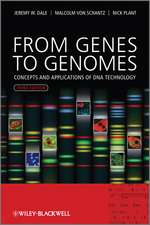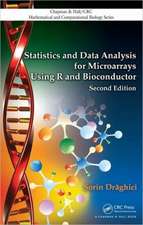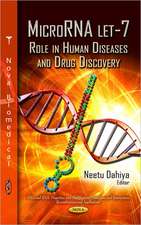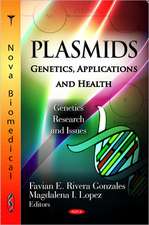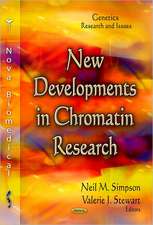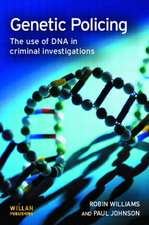Genetic Recombination: Reviews and Protocols: Methods in Molecular Biology, cartea 262
Editat de Alan S. Waldmanen Limba Engleză Hardback – 9 ian 2004
| Toate formatele și edițiile | Preț | Express |
|---|---|---|
| Paperback (1) | 638.57 lei 6-8 săpt. | |
| Humana Press Inc. – 10 noi 2010 | 638.57 lei 6-8 săpt. | |
| Hardback (1) | 645.79 lei 6-8 săpt. | |
| Humana Press Inc. – 9 ian 2004 | 645.79 lei 6-8 săpt. |
Din seria Methods in Molecular Biology
- 9%
 Preț: 791.59 lei
Preț: 791.59 lei - 23%
 Preț: 598.56 lei
Preț: 598.56 lei - 20%
 Preț: 882.95 lei
Preț: 882.95 lei -
 Preț: 252.04 lei
Preț: 252.04 lei - 5%
 Preț: 802.69 lei
Preț: 802.69 lei - 5%
 Preț: 729.61 lei
Preț: 729.61 lei - 5%
 Preț: 731.43 lei
Preț: 731.43 lei - 5%
 Preț: 741.30 lei
Preț: 741.30 lei - 5%
 Preț: 747.16 lei
Preț: 747.16 lei - 15%
 Preț: 663.45 lei
Preț: 663.45 lei - 18%
 Preț: 1025.34 lei
Preț: 1025.34 lei - 5%
 Preț: 734.57 lei
Preț: 734.57 lei - 18%
 Preț: 914.20 lei
Preț: 914.20 lei - 15%
 Preț: 664.61 lei
Preț: 664.61 lei - 15%
 Preț: 654.12 lei
Preț: 654.12 lei - 18%
 Preț: 1414.74 lei
Preț: 1414.74 lei - 5%
 Preț: 742.60 lei
Preț: 742.60 lei - 20%
 Preț: 821.63 lei
Preț: 821.63 lei - 18%
 Preț: 972.30 lei
Preț: 972.30 lei - 15%
 Preț: 660.49 lei
Preț: 660.49 lei - 5%
 Preț: 738.41 lei
Preț: 738.41 lei - 18%
 Preț: 984.92 lei
Preț: 984.92 lei - 5%
 Preț: 733.29 lei
Preț: 733.29 lei -
 Preț: 392.58 lei
Preț: 392.58 lei - 5%
 Preț: 746.26 lei
Preț: 746.26 lei - 18%
 Preț: 962.66 lei
Preț: 962.66 lei - 23%
 Preț: 860.21 lei
Preț: 860.21 lei - 15%
 Preț: 652.64 lei
Preț: 652.64 lei - 5%
 Preț: 1055.50 lei
Preț: 1055.50 lei - 23%
 Preț: 883.85 lei
Preț: 883.85 lei - 19%
 Preț: 491.88 lei
Preț: 491.88 lei - 5%
 Preț: 1038.84 lei
Preț: 1038.84 lei - 5%
 Preț: 524.15 lei
Preț: 524.15 lei - 18%
 Preț: 2122.34 lei
Preț: 2122.34 lei - 5%
 Preț: 1299.23 lei
Preț: 1299.23 lei - 5%
 Preț: 1339.10 lei
Preț: 1339.10 lei - 18%
 Preț: 1390.26 lei
Preț: 1390.26 lei - 18%
 Preț: 1395.63 lei
Preț: 1395.63 lei - 18%
 Preț: 1129.65 lei
Preț: 1129.65 lei - 18%
 Preț: 1408.26 lei
Preț: 1408.26 lei - 18%
 Preț: 1124.92 lei
Preț: 1124.92 lei - 18%
 Preț: 966.27 lei
Preț: 966.27 lei - 5%
 Preț: 1299.99 lei
Preț: 1299.99 lei - 5%
 Preț: 1108.51 lei
Preț: 1108.51 lei - 5%
 Preț: 983.72 lei
Preț: 983.72 lei - 5%
 Preț: 728.16 lei
Preț: 728.16 lei - 18%
 Preț: 1118.62 lei
Preț: 1118.62 lei - 18%
 Preț: 955.25 lei
Preț: 955.25 lei - 5%
 Preț: 1035.60 lei
Preț: 1035.60 lei - 18%
 Preț: 1400.35 lei
Preț: 1400.35 lei
Preț: 645.79 lei
Preț vechi: 759.76 lei
-15% Nou
Puncte Express: 969
Preț estimativ în valută:
123.58€ • 128.19$ • 103.04£
123.58€ • 128.19$ • 103.04£
Carte tipărită la comandă
Livrare economică 27 martie-10 aprilie
Preluare comenzi: 021 569.72.76
Specificații
ISBN-13: 9781588292360
ISBN-10: 1588292363
Pagini: 276
Ilustrații: X, 260 p.
Dimensiuni: 152 x 229 x 23 mm
Greutate: 0.57 kg
Ediția:2004
Editura: Humana Press Inc.
Colecția Humana
Seria Methods in Molecular Biology
Locul publicării:Totowa, NJ, United States
ISBN-10: 1588292363
Pagini: 276
Ilustrații: X, 260 p.
Dimensiuni: 152 x 229 x 23 mm
Greutate: 0.57 kg
Ediția:2004
Editura: Humana Press Inc.
Colecția Humana
Seria Methods in Molecular Biology
Locul publicării:Totowa, NJ, United States
Public țintă
ResearchCuprins
Studying Recombination Events in Eukaryotes.- Determination of Mitotic Recombination Rates by Fluctuation Analysis in Saccharomyces cerevisiae.- Determination of Intrachromosomal Recombination Rates in Cultured Mammalian Cells.- Intrachromosomal Homologous Recombination in Arabidopsis thaliana.- Analysis of Recombinational Repair of DNA Double-Strand Breaks in Mammalian Cells With I-SceI Nuclease.- Transformation of Monomorphic and Pleomorphic Trypanosoma brucei.- Forward Genetic Screens for Meiotic and Mitotic Recombination-Defective Mutants in Mice.- Recombination as a Reporter of Genomic Instability.- Detecting Carcinogens With the Yeast DEL Assay.- In Vivo DNA Deletion Assay to Detect Environmental and Genetic Predisposition to Cancer.- Recombination as a Tool for Producing Targeted Genetic Modification.- Gene Targeting at the Chromosomal Immunoglobulin Locus.- DNA Fragment Transplacement in Saccharomyces cerevisiae.- Targeted Gene Modification Using Triplex-Forming Oligonucleotides.- Using Nucleases to Stimulate Homologous Recombination.- Enhancement of In Vivo Targeted Nucleotide Exchange by Nonspecific Carrier DNA.- Biochemistry of Recombination.- Chromatin Immunoprecipitation to Investigate Protein-DNA Interactions During Genetic Recombination.- Holliday Junction Branch Migration and Resolution Assays.
Textul de pe ultima copertă
Genetic recombination plays an essential role in such vitally important biological processes as DNA repair, regulation of gene expression, disease etiology, meiotic chromosome segregation, and evolution. In Genetic Recombination: Reviews and Protocols, prominent international investigators actively engaged in recombination research describe in great detail their best techniques for studying recombination. The methods range from approaches and model systems to be used in a variety of eukaryotic organisms and in a mammalian parasite, to biochemical analyses useful for furthering the understanding of recombination mechanisms. Additional techniques use recombination as a reporter of genomic instability in lower and higher eukaryotes and as a tool for producing targeted genetic modification. Each readily reproducible method includes step-by-step instructions, a background introduction outlining the principle behind the technique, lists of equipment and reagents, and tips on troubleshooting and avoiding known pitfalls.
Cutting-edge and highly practical, Genetic Recombination: Reviews and Protocols offers both novice and experienced investigators an illuminating synthesis of what we currently know about recombination, as well as a wide-ranging collection of powerful tools for elucidating its mechanisms and regulation throughout biology today.
Cutting-edge and highly practical, Genetic Recombination: Reviews and Protocols offers both novice and experienced investigators an illuminating synthesis of what we currently know about recombination, as well as a wide-ranging collection of powerful tools for elucidating its mechanisms and regulation throughout biology today.
Caracteristici
Includes supplementary material: sn.pub/extras
